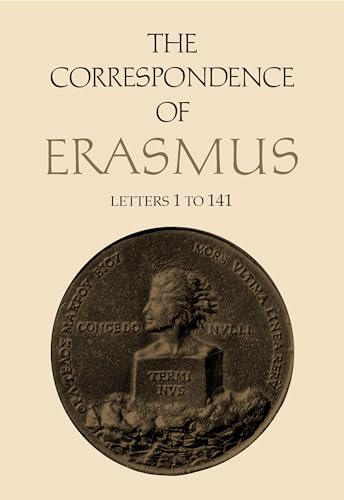The Correspondence of Erasmus: Letters 1-141, Volume 1 (Collected Works of Erasmus)
Erasmus, Desiderius
About the Book
Description:
SHIPS FROM USA. Used books have different signs of use and do not include supplemental materials such as CDs, Dvds, Access Codes, charts or any other extra material. All used books might have various degrees of writing, highliting and wear and tear and possibly be an ex-library with the usual stickers and stamps. Dust Jackets are not guaranteed and when still present, they will have various degrees of tear and damage. All images are Stock Photos, not of the actual item. Seller Inventory # 1-0802019811-G
About this title:
Synopsis:
The correspondence of Erasmus has never been completely translated into English, although it has long been acknowledged to be one of the most illuminating sources for the history of northern humanism and the first two decades of the Protestant Reformation. In his letters, to and from scholars and religions leaders, printers and patrons, princes and prelates in every country of western Europe, the interests and issues of that critical era found free expression. They are connected by the thread of Erasmus' personal experience, his joys and sorrows, triumphs and tribulations, and his uninhibited conversation with his friends.
Erasmus himself regarded his letters as a form of literature, and they were valued in his time, as they are now, as much for their style as for their content. In The Study of Good Letters (Clarendon 1963), H.W. Garrod wrote: 'As a document of the history of the times the Letters have primary importance. Yet they ar to be valued, ultimately, not as they enable us to place Erasmus in history, but as they help us to disengage him from it, to redeem him out of history into literature, placing him where, in truth, he longed to be. Not the Folly nor the Colloquies but the Letters, are his best piece of literature. What he did in scholarship, whether biblical, patristic, or classical has been superseded - though not the fine temper of it. That fine free temper shines also in the Letters, being indeed one of the elements of literature... In the immortality of their readableness Erasmus lives securely, immune from the discredits of circumstances.'
The volume of the correspondence is enormous, and its cumulative effect fully justifies the claims that have been made for its importance. Erasmus was from his youth on an indefatigable correspondent, although he was careless about preserving his own letters or those written to him until he became famous and found printers eager to publish them. As a consequence, 85 per cent of the surviving letters were written after he reached the age of forty-five. Even when he had no thought of publication, however, he strove ceaselessly to make his letters models of elegant classical latinity, while adjusting the style of each letter to fit its purpose, content, and recipient. Even the earliest letters of volume 1 bear evidence of this concern. This volume includes a number of youthful rhetorical attempts, letters describing his early vicissitudes as he struggled to maintain himself as a scholar, letters to friends and letters about enemies, letters to patrons and prospective patrons, and the beginnings of the more serious intellectual correspondence of his later years in an exchange of letters with John Colet on the subject of Christ's agony.
Volume 1 of the Collected Works of Erasmus series.
About the Author:
Desiderius Erasmus (c. 1466-1536), a Dutch humanist, Catholic priest, and scholar, was one of the most influential Renaissance figures. A professor of divinity and Greek, Erasmus wrote, taught, and travelled, meeting with Europe’s foremost scholars. A prolific author, Erasmus wrote on both ecclesiastic and general human interest subjects.
R.A.B. Mynors is Corpus Christi Professor of Latin, Oxford University.
D.F.S. Thomson is Professor of Classics, University College, University of Toronto. The late Wallace K. Ferguson held the J.B. Smallman Chair in History at the University of Western Ontario.Bibliographic Details
Title: The Correspondence of Erasmus: Letters 1-141...
Publisher: University of Toronto Press
Publication Date: 2002
Binding: Hardcover
Condition: Good
Book Type: book
